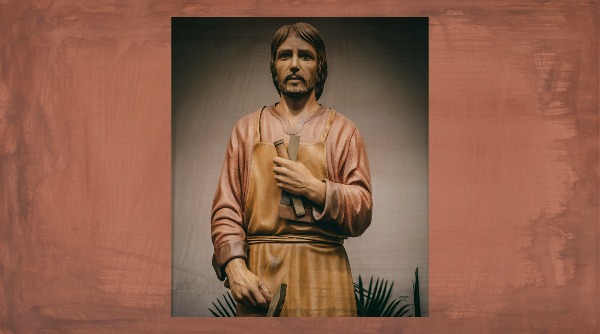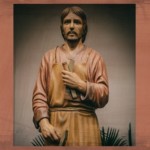Years ago I went for a walk with Alice von Hildebrand. The lovely Catholic philosopher and theologian had come into Phoenix to give a talk on God’s love, and desiring to enjoy the weather and the views around Camelback mountain, she found me a willing companion. Our conversation turned to my uncle, who had recently died after a terribly painful battle with stomach cancer.
I had described his life to her, and then she stopped me, looked into my eyes, and said in her beautiful accent, “You’ve got to write that.” Firmly. And I knew I should, not just because when Alice von Hildebrand tells you to do something, you probably should, but also because deep down I knew it was true. So, it took me years to do it, but I finally did–and intentionally just in time for the feast of St. Joseph the Worker, May 1st. It was, in fact, the first blog post I ever wrote.
“Uncle Dick” was my Dad’s older brother; he never married. A choice that, even in my childhood, I could sense was deliberate, somehow. His singleness allowed him the time and freedom to care for the poor and forgotten – the homeless, the mentally ill, a woman named Margaret whose aged, twisted body lay in a nursing home, and who he took us to visit. I remember one Christmas we lined her bedside as he led us in carols.
We, his nieces and nephews, benefitted, too. He loved us. And he loved to share his delight in nature with us – camping, hiking, swimming, ice skating, fishing…just going to Horicon Marsh to watch the Canadian geese gather there. For a little bookworm like me, it was a gift to be plunged into nature as he pointed out its loveliness.
On the way home from our adventures, we would sometimes stop at a chapel to visit Jesus. Because of course, it was his love of Jesus Christ that stirred him to serve, to love others. My Dad told me that sometimes Uncle Dick, a daily communicant, would nap in his car after work until the evening mass began in the basement chapel in the downtown Church of the Gesu.
You see, he was often weary. He worked hard. He labored for a living. He was a mechanic, an employee of the city who spent his days bending over – and laying under – the giant garbage trucks and snowplows that kept Milwaukee neighborhoods clean and clear. I remember visiting his station in the huge building where these men labored and seeing his large metal tool chest covered in holy cards. St. Joseph was surely represented there, because of all the saints, he was the favorite of my bearded uncle. A tattered book about St. Joseph rode along in Uncle Dick’s car, bouncing on the dashboard. I think those men, two thousand years apart, but united in the Eucharistic Heart of Jesus, were devoted friends.
St. Joseph must have appealed to Uncle Dick for his poverty, simplicity, charity, and purity. All the virtues we applaud him for. But when we kneel before his statues, maybe we don’t always remember that the hands holding the lilies were certainly calloused and scarred – and more comfortable with tools than flowers. Maybe we overlook at times that the hands that cradled the Christ Child also carved and crafted for long hours in order to provide a simple but stable life for the Son of God and His Mother, entrusted to this Patron of Workers.
But I’m sure my uncle remembered. I know he loved the Saint for his “hard-working hands.” That was something even a mechanic and the earthly father of Our Lord had in common. It was clear from looking at Uncle Dick’s hands that he was used to hard work. The deep cracks running like veins along his fingers were black with decades of grease and oil. No amount of the strange soap we’d find on his bathroom sink would ever make those hands white and soft. And I loved those hands. Those hands that tucked money into the pockets of the homeless. Those hands that fixed our family car – always for free. Those hands that built go-carts with my brothers. The hands that rang our doorbell with wild abandon and great joy when he arrived with treats on St. Joseph’s feast day. The hands that held my intentions with his own when they were folded in prayer.
Sometimes Uncle Dick would hold his hands in the air as if raised in praise, look at the sky, and half-laughing, sing a line from a song: “Take a look at these hard-working hands…” I never forgot that line, but I also never heard the song it came from. This Spring as I prayed a novena to St. Joseph in preparation for his Feast Day on March 19th, that song fragment popped into my head. And I had an overwhelming urge to look up the lyrics in their entirety. Turns out “These hands” was sung by Johnny Cash. Here are the lyrics:
These hands aren’t the hands of a gentleman
These hands are calloused and old
These hands raised a family, these hands built a home
Now these hands raised to praise the LordThese hands won the heart of my loved one
And with hers they were never alone
If these hands filled their task then what more could you ask
For these fingers have worked to the boneNow don’t try to judge me by what you’d like me be
For my life hasn’t been a success
Some people have power but still they grieve
While these hands brought me happinessNow I’m tired and I’m old and I haven’t much gold
Maybe things ain’t been all that I planned
Lord above hear my plea when it’s time to judge me
Take a look at these hard working handsTake a look at these hard working hands…
I was married and had moved away when my Uncle was diagnosed with stomach cancer. I wasn’t there to witness his passion, but I can testify to it. My last words to him, over the phone, were those of Mother Teresa: “Suffering is the Kiss of Jesus.” And he answered with a choked sob. Because he suffered. Oh, he suffered. Slowly, excruciatingly. But united to the Son of God, surely, and just as tradition tells us that Jesus and Mary held St. Joseph at the end (and for that he also holds the title “Patron of a Happy Death”) so too I know that they came for one whose hands had loved through labor. They came, and they looked, and they held those hands and lifted him to themselves. (After reading this post, my Dad called me to tell me something I didn’t know: Shortly before he died, my uncle, who had been unable to move for some time, sat up and pointing at the foot of his bed, said, “There’s St. Joseph!”)
I hope that St. Joseph can help all of us to look at our labor as a way of loving. Dishes, laundry – that’s my labor now. I’m far more likely to be lifting grocery bags than lumber. But every humble motion and movement can be a prayer when it’s done for love, especially love of Jesus, who, by entering into work sanctified it. Remember, Our Lord himself, in those hidden years, worked side-by-side with his father, covered in sawdust and sweat. Joined with Him our work becomes a prayerful motor, humming and propelling us to holiness. Bandaging the scraped knee, driving the carpool, kneading the dough, helping to craft the saints day costume or the book report diorama…our hands serve, our hands love. And may the Lord see all of that when we raise them up to Him in praise, finally, face-to-face, and in the creases and callouses maybe He will see a resemblance of those of His earthly father, and smile.
St. Joseph the Worker, pray for us!
This article, “St. Joseph’s Hands,” originally appeared on SpiritualDirection.com and appears here with kind permission












